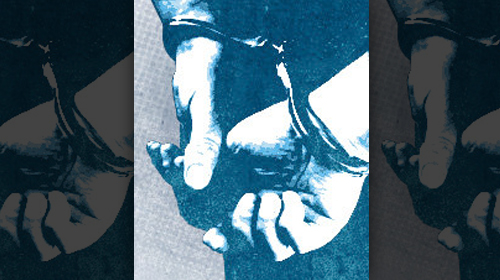Supreme Court Says Jails Can Strip Search You – Even for Traffic Violations


Yesterday a divided Supreme Court ruled in that any person arrested can be subject to a strip search — even for a minor offense or traffic violation — without any reason to suspect that they may be carrying a weapon or contraband.
As disturbing as the practice of subjecting people accused of minor offenses to degrading strip searches is, it wouldn’t be a problem if those people weren’t thrown behind bars in the first place. Unfortunately, U.S. jails are full of people accused of minor, nonviolent crimes. One such person was Albert Florence, a 35-year-old Black man erroneously arrested in 2005 for failing to pay a traffic fine he had already paid — and whose experience is the center of the case decided by the Court.
A New Jersey state trooper pulled over Florence’s pregnant wife as she was driving Florence and their 4-year-old son to dinner to celebrate their purchase of a home. Because Florence owned the vehicle, the officer ran his license and discovered a warrant for an outstanding noncriminal traffic fine. Despite the fact that Florence had already paid the fine and carried an official letter proving it, the police handcuffed and arrested him and dragged him off to jail. He was incarcerated for six days and subjected to two invasive strip searches. As , "I was just told, 'Do as you're told.' Wash in this disgusting soap and obey the directions of the officer who was instructing me to turn around, lift my genitals up, turn around, and squat." The next day a judge freed Florence, confirming that he had in fact paid his fine. (You can hear more from Florence in an )
In a 5-4 opinion, the Court held that two New Jersey county jails had not violated the Fourth Amendment by routinely strip searching all new detainees including those, like Albert Florence, who had been arrested for minor offenses and were unlikely to spend more than one night in jail. With 13 million Americans jailed each year, the decision could have far-reaching consequences.
At the same time, the Court was careful to note that the strip search policies it upheld did not involve any physical contact with the detainee, and only applied to detainees who were housed with the general population. Whether those reservations prove to be meaningful constraints on the power of prison officials to strip search detainees remains to be seen. More significantly, perhaps, at least 10 states already prohibit routine strip searches without reasonable suspicion, including New Jersey. (Read the ŔĎ°ÄĂĹżŞ˝±˝áąű’s amicus brief submitted on behalf of former attorneys general of New Jersey.)
Yesterday’s ruling provides the country with an opportune moment to reflect on our epidemic of mass incarceration. There are 6 million people currently in prison or under correctional supervision in the U.S. — .As Florence’s case shows, incarceration isn’t just for serious crimes anymore. These days you can go to jail for jaywalking and unpaid traffic fines — even if you have proof . Almost 80 percent of people in jail are there for . The government can keep you jail for days or months before you ever see a courtroom — in one case, a man was pulled over for a DWI and . And now the Supreme Court says in some cases it’s constitutional to strip search you once they haul you in, even if there is no particular reason to think you present a threat to jail security.
This ruling also provides us with a chance to reflect on the very present problem of racial profiling. New Jersey has an admitted historic trend of racially profiling Black motorists. When Florence was arrested in 2005, the state was under after a lawsuit exposed significant issues of police racial profiling. According to a recent Department of Justice study, there is “an alarming racial disparity” in police treatment of motorists of color in the U.S. As , Black Americans are twice as likely to be arrested during a traffic stop and nearly four times as likely to experience the threat or use of force. Cops for minor traffic infractions and then arrest them, while they let white drivers drive on. With these types of practices, it’s no wonder , like Albert Florence, wind up behind bars these days.
What happened to Albert Florence isn’t an anomaly. This country’s arrest-happy policies and selective enforcement have made us the largest incarcerator in the world, with an ever-growing web of criminal laws ready to catch us all. Yesterday’s Supreme Court decision means that if you’re arrested — for anything — you might be subject to a strip search.
Learn more about search and seizure: Sign up for breaking news alerts, , and .


